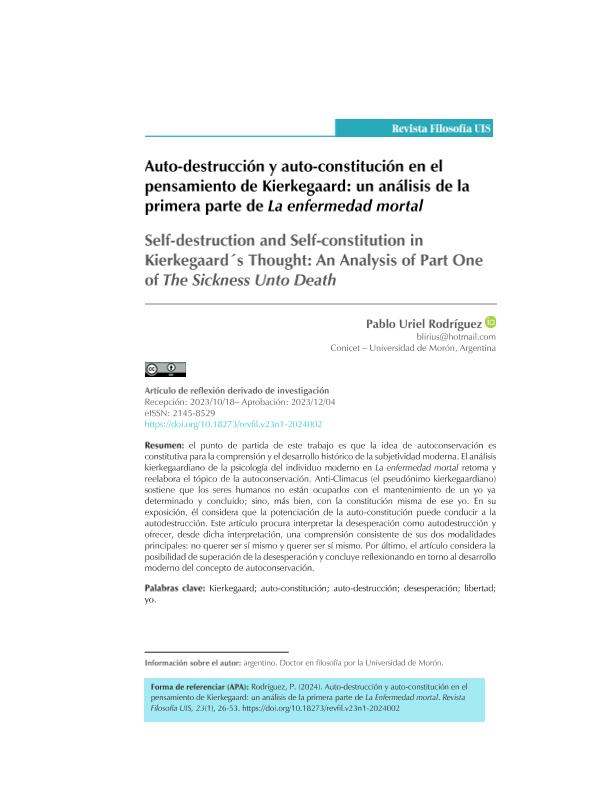Mostrar el registro sencillo del ítem
dc.contributor.author
Rodríguez, Pablo Uriel

dc.date.available
2024-03-18T12:20:19Z
dc.date.issued
2024-02
dc.identifier.citation
Rodríguez, Pablo Uriel; Auto-destrucción y auto-constitución en el pensamiento de Kierkegaard: un análisis de la primera parte de La Enfermedad mortal; Universidad Industrial de Santander; Filosofía UIS; 23; 1; 2-2024; 26-53
dc.identifier.issn
1692-2484
dc.identifier.uri
http://hdl.handle.net/11336/230776
dc.description.abstract
El punto de partida de este trabajo es que la idea de autoconservación es constitutiva para la comprensión y el desarrollo histórico de la subjetividad moderna. El análisis kierkegaardiano de la psicología del individuo moderno en La enfermedad mortal retoma y reelabora el tópico de la autoconservación. Anti-Climacus (el pseudónimo kierkegaardiano)sostiene que los seres humanos no están ocupados con el mantenimiento de un yo ya determinado y concluido; sino, más bien, con la constitución misma de ese yo. En su exposición, él considera que la potenciación de la auto-constitución puede conducir a la autodestrucción. Este artículo procura interpretar la desesperación como autodestrucción y ofrecer, desde dicha interpretación, una comprensión consistente de sus dos modalidades principales: no querer ser sí mismo y querer ser sí mismo. Por último, el artículo considera la posibilidad de superación de la desesperación y concluye reflexionando en torno al desarrollo moderno del concepto de autoconservación.
dc.description.abstract
The starting point of this paper is that the idea of self-preservation is constitutive for the understanding and historical development of modern subjectivity. Kierkegaard´s analyses the psychology of the modern individual in his pseudonymous work The Sickness unto Death takes up and reworks the topic of self-preservation. Anti-Climacus (Kierkegaard's pseudonym) argues that human beings are not concerned with the maintenance of an already determined and concluded self, but rather with the actual constitution of this self. In his presentation, he considers that the empowerment of self-constitution could lead to self-destruction. This article attempts to interpret despair as self-destruction and, from this interpretation, to offer a consistent understanding of its two main modalities: not will to be oneself and will to be oneself. Finally, the article considers the possibility of overcoming despair and concludes by reflecting on the modern development of the concept of self-preservation.
dc.format
application/pdf
dc.language.iso
spa
dc.publisher
Universidad Industrial de Santander
dc.rights
info:eu-repo/semantics/openAccess
dc.rights.uri
https://creativecommons.org/licenses/by/2.5/ar/
dc.subject
KIERKEGAARD
dc.subject
AUTO-CONSTITUCIÓN
dc.subject
AUTO-DESTRUCCIÓN
dc.subject
DESESPERACIÓN
dc.subject.classification
Filosofía, Historia y Filosofía de la Ciencia y la Tecnología

dc.subject.classification
Filosofía, Ética y Religión

dc.subject.classification
HUMANIDADES

dc.title
Auto-destrucción y auto-constitución en el pensamiento de Kierkegaard: un análisis de la primera parte de La Enfermedad mortal
dc.type
info:eu-repo/semantics/article
dc.type
info:ar-repo/semantics/artículo
dc.type
info:eu-repo/semantics/publishedVersion
dc.date.updated
2024-03-14T15:02:02Z
dc.identifier.eissn
2145-8529
dc.journal.volume
23
dc.journal.number
1
dc.journal.pagination
26-53
dc.journal.pais
Colombia

dc.journal.ciudad
Bucaramanga
dc.description.fil
Fil: Rodríguez, Pablo Uriel. Consejo Nacional de Investigaciones Científicas y Técnicas; Argentina. Universidad de Morón; Argentina. Universidad Nacional de General Sarmiento. Instituto de Ciencias; Argentina
dc.journal.title
Filosofía UIS
dc.relation.alternativeid
info:eu-repo/semantics/altIdentifier/url/https://revistas.uis.edu.co/index.php/revistafilosofiauis/article/view/14718
dc.relation.alternativeid
info:eu-repo/semantics/altIdentifier/doi/https://doi.org/10.18273/revfil.v23n1-2024002
Archivos asociados
